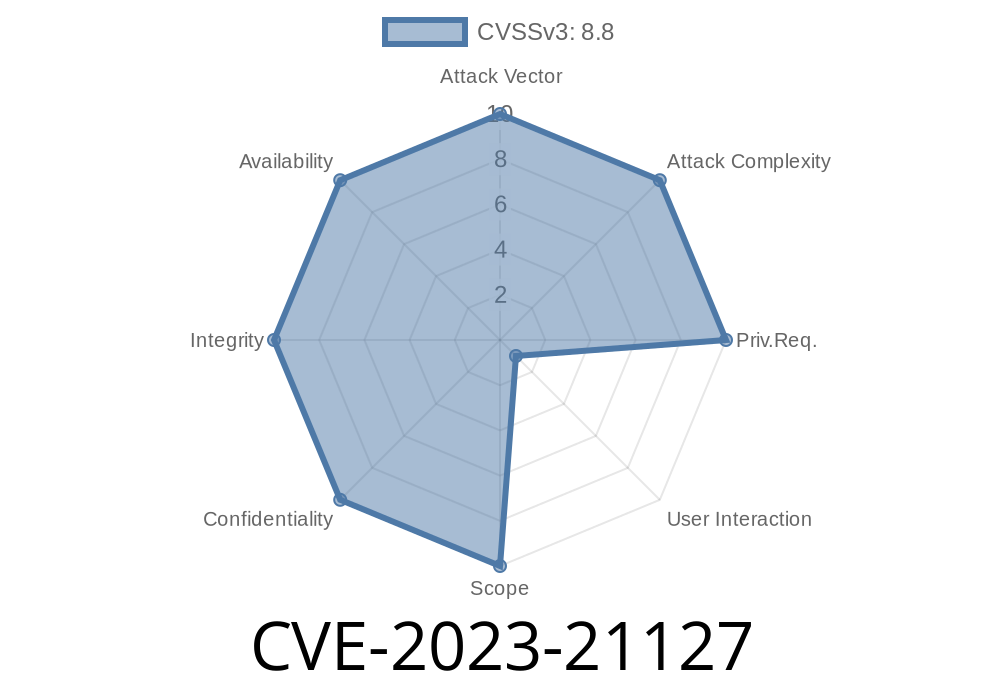Android's media framework is a crucial part of everyday smartphone experiences. But sometimes, under-the-hood bugs creep in that expose a massive attack surface. One such critical vulnerability—CVE-2023-21127—was discovered in the NuMediaExtractor.cpp file. This post breaks down the bug in simple terms, walks through the exploit details, and shows how uninitialized data could let an attacker run code on your device with just a malicious media file.
What Is CVE-2023-21127?
This vulnerability lives in the readSampleData function inside NuMediaExtractor.cpp, part of the Android media framework. If you're running Android 11, 12, 12L, or 13, your device could be at risk.
Privileges Required: None (code runs with media service privileges)
- Android Security Bulletin: A-275418191
Understanding the Root Cause
Let's keep it simple: an “out-of-bounds write” happens when a program writes data past the end (or before the start) of a memory buffer. This can overwrite important data or even allow the execution of malicious code.
In NuMediaExtractor.cpp, the readSampleData function didn’t properly initialize memory before writing to it. If an attacker crafts a special media file, it can cause the media framework to write data somewhere it shouldn’t—potentially opening the door to running unauthorized code.
Vulnerable Code Snippet
*Excerpt from* NuMediaExtractor.cpp *before fix:*
status_t NuMediaExtractor::readSampleData(
int64_t trackIndex, const sp<ABuffer> &buffer,
size_t *actualSize) {
// ... (some code omitted for simplicity)
ssize_t size = mTrack->read(
trackIndex, buffer->data(), buffer->capacity());
// 'size' can be negative if an error occurs
if (size >= ) {
// Size not validated or adjusted here
buffer->setRange(, size); // size can overflow
*actualSize = size;
return OK;
}
// ... (error handling)
}
If mTrack->read returns a large value (could be attacker-controlled), setting buffer->setRange(, size) leads to writing out of bounds of the buffer’s memory. If uninitialized or overlarge, this can overwrite sensitive data or code pointers—a classic RCE vector.
Exploit Flow (How Attackers Can Use This Bug)
1. Create a Malicious Media File: An attacker crafts a media file (e.g., a video or audio file) that will trigger the bug.
2. Lure the Victim: The victim opens the file using any app that relies on NuMediaExtractor (native video player, messaging app, etc.).
3. Out-of-Bounds Write: The media framework processes the file, and due to the bug, it writes past the end of the buffer.
4. Remote Code Execution: By carefully structuring the payload, the attacker can hijack the code flow to execute arbitrary code as the media service.
Proof of Concept (PoC) Structure
While real attack code is dangerous, here's a simplified, safe pseudo-example to understand how the bug could be triggered:
# Pseudocode for a malicious media file generator
media_file = create_valid_media_file()
# Pad the payload so that the size value overflows the buffer
payload = 'A' * x10000000 # large number triggers OOB
media_file.add_track_data(payload)
media_file.save("oob_media.mp4")
# When this file is played on a vulnerable device, it triggers the bug
Fix Details
Google’s patch ensures the size variable is validated so that it cannot overflow the buffer. The updated function checks that size is within the expected bounds before setting the buffer’s range.
*Fixed code (simplified):*
if (size > && size <= buffer->capacity()) {
buffer->setRange(, size);
*actualSize = size;
return OK;
} else {
// Handle error, don't write out of bounds
return ERROR_MALFORMED;
}
References
- Android Security Bulletin - June 2023
- Google Issue Tracker: A-275418191
- Blob of NuMediaExtractor
Don’t open suspicious media files from untrusted sources—just one click can be enough.
- Developers: Always validate buffer sizes before writing, especially in anything to do with user-provided files.
Stay safe, and remember: Even a single unchecked variable can turn your phone into an attacker's playground.
*If you want to read more on Android security bugs, check out the Official Android Security Bulletins for each month!*
Timeline
Published on: 06/15/2023 19:15:00 UTC
Last modified on: 06/21/2023 13:11:00 UTC
